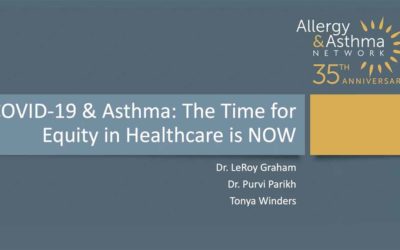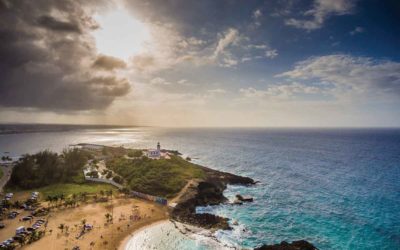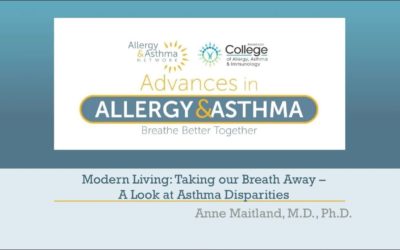Learn about our efforts that bring an end to racial disparities affecting people with asthma, allergies and related conditions.
Health Disparities
A Statement from Allergy & Asthma Network – Racial Injustice and Health Disparities
We are distressed and saddened to see the pain of racial injustice in our country … Our mission is rooted in civic and social responsibility and we stand with those who seek a more just society.
COVID-19 & Asthma: The Time for Equity in Healthcare is NOW
Our speakers reviewed the racial, economic and social determinants of health (SDoH) impacting healthcare among the most vulnerable in our society.
Why Are Asthma Rates Higher in Puerto Rico?
The PRIMERO study tracks biomarkers that can predict asthma in children starting at birth to help with early interventions in treatment and prevention.
Health Disparities, Asthma and Differential Responses to Therapy
Learn about health disparities and asthma in high-risk groups; effective therapy for high-risk groups and actionable community partnerships.
Role of Community Health Worker for Patients with Asthma
The webinar speaker presented information about the role of the community health worker for patients with asthma and with health disparities.
A Look at Asthma Disparities
This webinar covered the major factors contributing to asthma morbidity and mortality, including health disparities that impact patients with asthma.
‘We Called Him Itty’ – But He Had Big Dreams
Izaiah Fiedler tragically died from suicide whilte on montelukast for asthma. His family now advocates for improved asthma care and suicide prevention.
Native American Children Face Many Barriers to Asthma Care
Only in recent years has the need for greater understanding about health disparities of Native American children with asthma become a priority.
How Access to Healthy Foods Impacts Asthma
By Laurie Ross More than 6 million children in the United States have asthma – almost one in 12....
All About
Asthma and allergies occur in all racial, ethnic and socioeconomic groups, but they are more common in African American, Hispanic/Latino and Native American communities, particularly those living in poor urban areas. Health insurance coverage, income levels, and even where people live contribute to disparities in care. Living in a city with high pollution levels, living in an older building with vermin infesting the home, relying on public transportation, and living with mold can contribute to poor management of asthma and disproportionately affect people along racial and ethnic lines. People of color have higher rates of death from asthma and severe allergies, as well as a higher incidence of emergency department visits and hospital stays.
Allergy & Asthma Network is committed to creating and expanding programs to address the imbalance of care for these populations. The Network provides medication assistance programs and bilingual resource guides and addresses health disparities at the federal, state and local level. Advocacy takes many forms, but affordable access to medication, accessible telehealth solutions for those unable to physically see a doctor, accountability from health insurance and pharmaceutical companies, availability of life-saving medications in schools and public places and reduced pollution of air and water are some of the Network’s key legislative issues.
Some important help the Network recently received was a CDC grant and a Patient-Centered Outcomes Research Institute (PCORI) Engagement Award. The CDC grant will be used to implement national standard-of-care guidelines for asthma patients aimed at reducing ER visits and hospitalizations. The PCORI engagement award will be used for a virtual symposiums that bring together African American patients, as well as doctors, researchers and faith-based leaders to present research and to discuss the opportunities, gaps and barriers in engaging African American patients in patient-centered research.
The Network also reaches out to at-risk people and underserved communities through its Not One More Life Trusted Messengers program, a joint public-private partnership and large-scare community project that offers free COVID-19 testing, asthma and COPD screenings and patient education.
The current COVID-19 crisis has highlight health disparities, finding that African Americans and Hispanic/Latino populations and Native Americans face significantly higher rates of COVID-19 cases, hospitalizations and deaths. Ongoing disparities in physical health and social determinants of health play a role in the number of cases and deaths. Poverty is a significant issue for many racial and ethnic minorities, so some protective measures against COVID-19 may be less feasible. Many may rely on public transportation, have limited access to healthcare, live in close living quarters and may also work in essential jobs, which may increase risk of exposure to the virus.
All of these efforts are the beginning of the Network’s efforts to close the gap in healthcare outcomes along racial lines.








